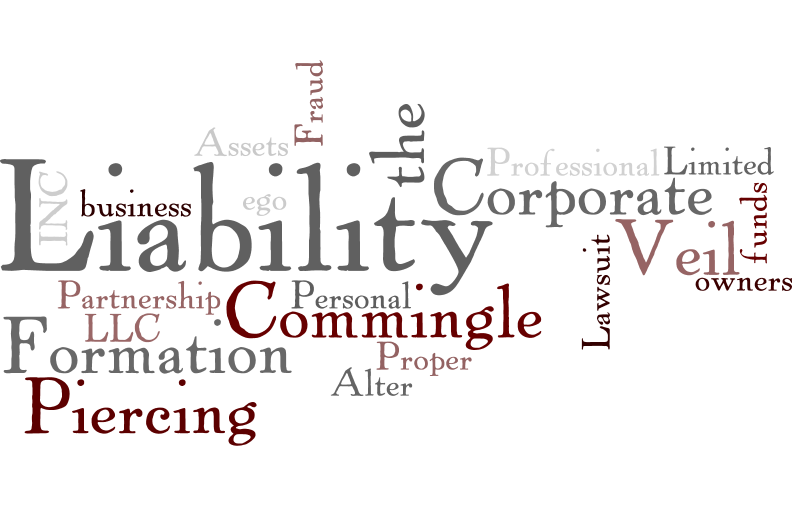Have you ever considered investing in a friend or family member's business or idea? This blog is for you!
Read MorePiercing the corporate veil
When you started your company, you probably thought your personal assets were safe. What if they weren't? This post provides the basics of "Piercing the Corporate Veil", an important concept related to personal liability for business actions.
Read MoreForming a Business Part 2: The Sole Proprietorship
The Sole Proprietorship
As mentioned in Part 1, the Sole Proprietorship (SP) is the easiest "Business Entity" to form. Many people that start their own business out of their home, or have a hobby that brings in a little cash, more than likely operate as a SP. The name explains it all! Sole = Solo or Single. Proprietorship = Business/Trader. In short, SP's are tied directly to its single founder/owner. As the owner lives and dies, so does the SP. There is no legal distinction between the owner of the business, and the business itself. This has limited benefits and substantial drawbacks depending on the nature of the business.
Benefits
The primary benefit to starting a SP is that it is quick and easy. In some cases, the founder wouldn't even have to do anything at all. John Doe could go out and start transacting business right away! If he wanted to be John Does Widget Service, all he would have to do is register his fictitious name or DBA with the state of Florida for a small fee. If applicable, the SP can also register to pay sales tax with the appropriate DOR. Most SP's even open business bank accounts in order to keep accounting straight, but this step isn't a requirement.
Paying income taxes is relatively simple as well. The profits earned by the business are counted directly toward the taxable income of the founder. In a round about way, it is like giving yourself a 1099. Your accountant or tax preparation software should do a good job of helping you navigate this area. Keep in mind, most people don't take taxes out on their SP earned income. This may result in a relatively high tax bill at the end of the year!
Drawbacks
While they are easy to start, the SP isn't always the best choice for at least one major reason.
Unlimited Liability for Owner
This is the most important and often overlooked disadvantage. If you operate a Sole Proprietorship, as the owner of the business, all of your personal assets are subject to any business related lawsuit. That means, in the event someone sues you related to a business transaction you had with them, they will be able to come after your personal assets in order to fulfill a judgement against you.
if you are operating a business as a Sole Proprietor, this may leave you asking;
"How can I protect myself?"
The answer is relatively simple. 1) Form an LLC, Inc, or other relevant business entity that provides a liability shield, and/or 2) Explore insurance options. These two options cost marginally more money than starting and continuing to operate your Sole Proprietorship, but will provide you the peace of mind that your personal assets are protected. Contact us for a free consultation regarding whether or not an LLC or an Inc. is right for you!
Forming A Business Part 1: What is a business entity?
This is the first installment of blog posts that will deal directly with forming a business. What type of entity should you choose? What are the benefits and drawbacks? How can you adequately prepare for taxes? You will find many of those answers right here on the blog.
What is a Business Entity?
Fundamentally a business entity is a fictional being created under the laws of a specific state. Think of it as a person. It owns property, earns money, pays bills, is subject to law suits, etc. Business Entities live and die but not always at the mercy of its owner. In Delaware, at times there have been more "Business Entity" citizens than there are real people!
The most common types of business entities include, Corporations (Inc.), Limited Liability Companies (LLC), Partnerships, and Sole Proprietorships. Each of these entity types will be described in greater detail in future posts. There are a variety of reasons that an entrepreneur might choose one over another, and there are in fact a variety of other entities that aren't mentioned here. Each type has benefits and draw backs, and the individual needs of the business owner need to be carefully considered before jumping right in to doing business.
The most common reason for choosing a business entity is to limit personal liability of the owners. Not all entities are created equal in this regard. A sole proprietorship doesn't provide any liability protection, but it is the cheapest to form. On the flip side, a Corporation tends to provide excellent liability protection, but it isn't right for everyone, and if you're not careful, it may not provide liability protection either! Be sure to keep a close eye on future blogs to get an idea for what entity might be right for you and your business.
Are you starting a business today?
Do you have questions about what entity you should pick? We are happy to help! Please Contact Us to set up a free consultation!

